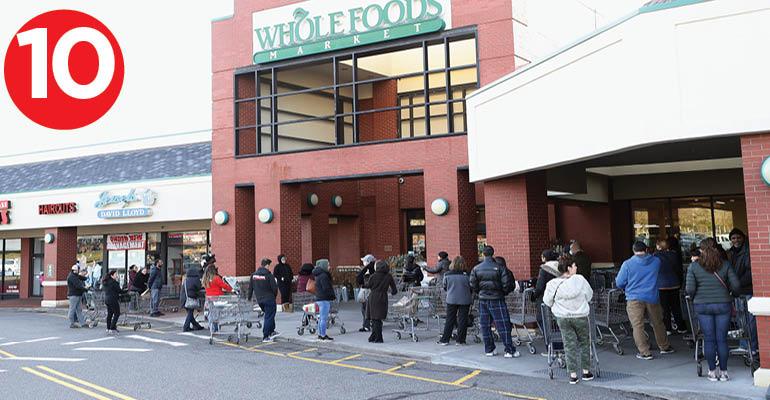- Rent Strike Idea Gaining Steam During Coronavirus Crisis “With millions of people suddenly out of work and rent due at the first of the month, some tenants are vowing to go on a rent strike until the coronavirus pandemic subsides. New York, Boston, Los Angeles, San Francisco and St. Louis are among many cities that have temporarily banned evictions, but advocates for the strike are demanding that rent payments be waived, not delayed, for those in need during the crisis. The rent strike idea has taken root in parts of North America and as far away as London.” (Associated Press)
- Whole Foods Employees Are Staging a Nationwide ‘Sick-Out’ “Whole Foods employees are planning to strike on Tuesday to protest the lack of protections offered to workers during the coronavirus pandemic—the first national collective action led by workers at the company since it was founded in 1980. On March 31, Whole Foods employees will call in sick to demand paid leave for all workers who stay home or self-quarantine during the crisis, free coronavirus testing for all employees, and hazard pay of double the current hourly wage for employees who show up to work during the pandemic.” (Vice)
- Macy’s Will Start Furloughing Most Employees This Week as it Copes with Significant Sales Losses “Macy’s said the majority of its employees will be furloughed beginning this week as it copes with significant sales losses during the coronavirus pandemic. The retailer declined to say how many employees will be affected by the furloughs. It said it’s lost most of its sales, even as it remains open online, and that’s why cost cuts are necessary. Macy’s is one of dozens of retailers that have been forced to close stores to slow the spread of the coronavirus in the U.S.” (CNBC)
- Kohl’s Furloughs Workers Amid Extended Store Closures, Draws Down Full $1 Billion Revolving Credit Facility “Kohl's Corp. said Monday that it will extend store closures until further notice and, as a result, will furlough many store associates, distribution center workers and corporate staff whose duties are tied to store operations. Kohl's still offers e-commerce ordering and, starting April 2, in-store pickup between the hours of 11 a.m. and 7 p.m. local time will be available. Furloughed staff will continue to receive existing health benefits.” (MarketWatch)
- As Offices Empty, CRE Picture Looks Bleak “Similar to the 2008 financial crisis, commercial real estate values could take a hit, fueling the current crisis but for a new reason: working from home. Before millions of U.S. workers were sent home in recent weeks due to the COVID-19 pandemic, there were 3.4 million full-time employees who reported that they primarily worked from home in 2017, according to a recent study by the Federal Reserve Bank of St. Louis. That figure represented 3% of the workforce in 2017, a spike from 1.2% in 2005, when working from home started to pick up.” (American Banker)
- Amazon Is Offering Warehouse Workers More Pay to Transfer to its Grocery Unit as Demand Continues to Surge “Amazon is offering higher pay to recruit its own warehouse employees to pick and pack Whole Foods groceries amid rising demand and a worker shortage, according to an internal document reviewed by Reuters. This move, known as labor sharing, highlights how the ecommerce giant is reallocating some of its vast workforce to handle a spike in online sales of groceries, as millions of American are stuck at home amid the COVID-19 outbreak.” (Business Insider)
- California Pot Dispensaries Are Open During Coronavirus Crisis. Some Want Them Closed “In designating California’s marijuana industry as essential under the state’s COVID-19 stay-at-home order, the administration of Gov. Gavin Newsom has argued that the health benefits of keeping pot shops open outweigh the risks — even as opponents of the policy call it reckless. Critics say it doesn’t make sense to allow people to congregate at cannabis stores, increasing the chance of infection, so they can buy products that are smoked at a time when the virus is attacking respiratory systems.” (Los Angeles Times)
- WeWork Is Selling Meetup to AlleyCorp for a Fraction of its 2017 Price “WeWork is selling Meetup, the social network that encourages people to get together in person, to AlleyCorp and a team of private investors, the coworking company has confirmed to Fortune. The sale comes just days after WeWork’s majority owner, SoftBank, announced a $41 billion asset sale to help it weather the downturn in the global economy because of the spread of the coronavirus.” (Fortune)
- Coworking vs. Coronavirus: Overcoming Challenges “The recent COVID-19 pandemic has rocked the worldwide economy’s boat, its effects taking a toll on various real estate sectors. The hospitality, entertainment and retail industries are already feeling the effects. The quickly spreading coronavirus has prompted commercial space landlords and operators to adjust and find alternatives in order to keep their businesses functional.” (Commercial Property Executive)
- Will Coronavirus Permanently Change CRE Lending? “The economic paralysis from the coronavirus outbreak could upend commercial real estate and accelerate loan losses for banks. High vacancies are hurting hotels, while closed retail outlets are poised to cause headaches for malls and shopping centers. Offices could struggle over the long run as more Americans work remotely and employers decide they can get by with less space. Those developments are apt to cause near-term credit issues and long-term adjustments in the CRE business.” (American Banker)
0 comments
Hide comments





